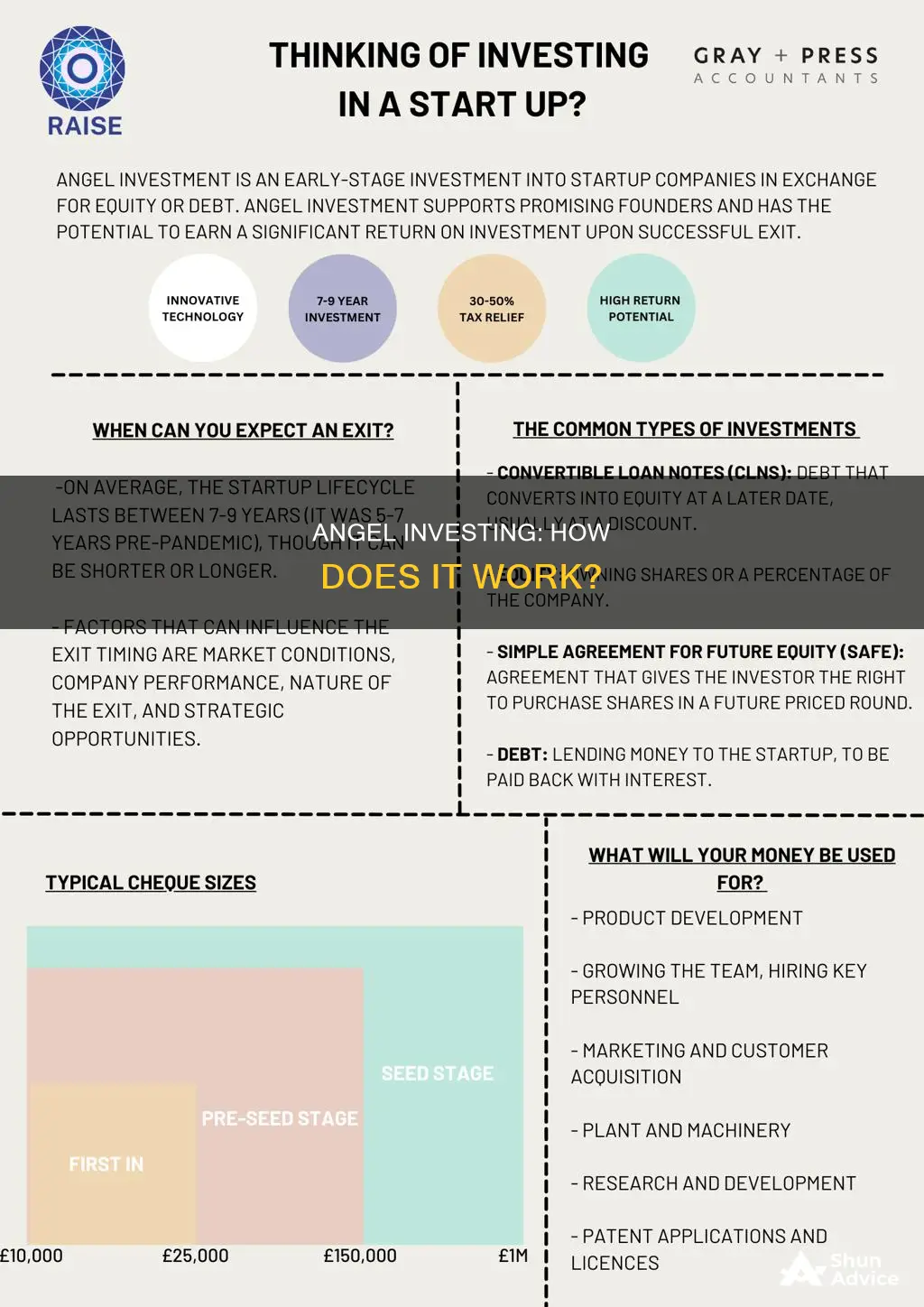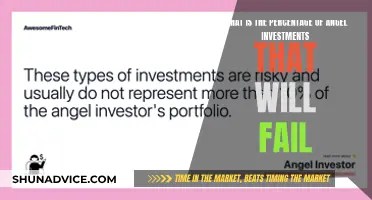
Angel investors are individuals who provide capital for business ventures and startups in need of funding. They are typically wealthy individuals who are often business founders and CEOs themselves. Angel investors provide seed money for startups in their early stages and in exchange, they usually receive ownership equity if the idea takes off. They are usually well-connected and have a vested interest in supporting innovative business ideas. They are often established entrepreneurs themselves, who understand the level of risk involved and are comfortable taking it on. Angel investors can be found through online platforms, social media networks, or local business organizations in one's community.
| Characteristics | Values |
|---|---|
| Type of investor | Wealthy individuals, often business founders and CEOs themselves |
| Investment type | Seed money for startups in their early stages |
| Investment expectations | Expect a high rate of return on their money, such as 10x their original investment inside the first 5-7 years |
| Investment range | $25.6 billion in the US in 2020 |
| Investment motives | A genuine interest in innovation and a desire to be involved |
| Investment style | Focus on helping startups take their first steps |
| Investment sources | AngelList, Angel Investment Network, LinkedIn, local business groups or schools |
| Investment process | Entrepreneurs pitch their business plan to a panel of potential investors |
| Investment considerations | The investor's ability to provide strategic guidance and industry connections |
What You'll Learn
- Angel investors are typically wealthy individuals who provide seed money for startups in their early stages
- In exchange for funding, angel investors usually receive ownership equity in the company
- Angel investors are often well-connected and can provide strategic guidance and industry connections
- Entrepreneurs can find angel investors through online platforms, social media networks, and local business organizations
- Angel investing is a high-risk, high-reward activity that offers the opportunity to claim a sizable stake in a startup

Angel investors are typically wealthy individuals who provide seed money for startups in their early stages
Angel investors are individuals who provide capital for business ventures and startups in need of funding. They are typically wealthy individuals who are often business founders and CEOs themselves. Angel investors usually provide their own money in exchange for a share of the company they are investing in.
Angel investors provide seed money for startups in their early stages. They are often past entrepreneurs themselves, so they understand the risks involved and are comfortable taking them on. They are usually well-connected and have a genuine interest in innovation and a desire to be involved. They can be a great source of funding for entrepreneurs who cannot get conventional bank loans or do not want the burden of big debt until their ideas take off.
In exchange for their investment, angel investors typically receive ownership equity in the company. The percentage of ownership they request usually depends on how much they are investing. Angel investors are not providing loans, so they do not expect to be paid back unless the idea succeeds. Instead, they focus on helping startups take their first steps and are motivated to see them succeed. They may also offer strategic mentorship, industry connections, and guidance on product development.
Finding the right angel investor is crucial for a startup's growth. Entrepreneurs should look for investors who believe in their vision, align with their values, and can provide strategic guidance and support. It is important to build relationships and gain perspective from potential investors to determine if they are a good fit for the company.
ETFs: Why Investors Are Flocking
You may want to see also

In exchange for funding, angel investors usually receive ownership equity in the company
Angel investors are individuals who provide capital for business ventures and startups in need of funding. They are typically wealthy individuals, often business founders and CEOs themselves, who exchange their own money for a share of the company they are investing in. Angel investors are usually well-connected and have a vested interest in supporting innovative business ideas. They are welcomed by cash-strapped entrepreneurs who cannot get conventional bank loans or do not want the burden of big debt until their ideas take off.
Angel investors are early-stage investors in a startup. They provide seed money, usually in exchange for ownership equity in the company. This is a high-risk, high-reward activity for angel investors, as they will only receive a reward if and when the business takes off. The investor's involvement may be a one-time infusion of seed money, or they may provide regular injections of cash to bring a product to market.
The percentage of ownership an angel investor requests usually depends on how much they are investing. It is not uncommon for an angel investor to expect a 30% return on their money. The ROI expectation varies between angels and the specific investing opportunity. Angel investors will have an ROI expectation in mind as part of their exit strategy, which is when they sell their equity in the company to make up their initial investment and any profits.
Angel investors typically bring years of expertise to the table and already understand what it takes to bring success to a startup. They can also provide strategic mentorship, industry connections, and guidance on product development.
CSGO: Invest in Player Autographs
You may want to see also

Angel investors are often well-connected and can provide strategic guidance and industry connections
Angel investors are typically wealthy individuals who are often well-connected and can provide strategic guidance and industry connections. They are usually business founders and CEOs themselves, investing their own money in exchange for a share of the company they are investing in.
Angel investors are often former entrepreneurs who have successfully exited their own ventures and are looking to support innovative business ideas. They understand the risks involved in starting a business and are comfortable taking them on. This makes them valuable sources of advice and mentorship for entrepreneurs.
When choosing an angel investor, it is important to consider more than just the funding they can provide. Look for someone who believes in your vision, aligns with your values, and can offer strategic guidance and industry connections. Building a long-term partnership with an investor who can provide ongoing support and mentorship can be more valuable than a large sum of money.
To find well-connected angel investors, you can start by creating a list of people with relevant subject matter expertise or connections in your target field. Utilize online platforms, social media networks, and local business organizations to network and make connections. Attend industry events and join startup communities to increase your chances of meeting potential investors.
Remember that angel investing is a high-risk, high-reward activity for investors. They are looking for businesses with high growth potential that can provide a significant return on their investment. As such, they will be interested in your business plan, financial projections, and ability to execute your ideas.
Invest or Buy Land: Understanding the Key Differences for Long-Term Wealth
You may want to see also

Entrepreneurs can find angel investors through online platforms, social media networks, and local business organizations
Angel investors are individuals who provide capital for business ventures and startups in need of funding. They are typically wealthy individuals, often business founders and CEOs themselves, who exchange their own money for a share of the company they are investing in. Entrepreneurs can find angel investors through online platforms, social media networks, and local business organizations.
Online platforms such as AngelList, a platform that helps business owners find investors, and Angel Investment Network, a network with over 279,000 investors, are great places to start. Entrepreneurs can create a profile and promote their business, and if there are interested angels, they will invest. LinkedIn, a professional social network, can also be a direct way to contact an angel investor.
Social media networks can also be a useful tool for connecting with angel investors. Entrepreneurs can use these platforms to network with other business owners and leaders and see if they can put them in contact with potential investors. It is important to have a strong online presence and to utilize relevant hashtags and keywords to increase visibility and connect with the right people.
Local business organizations and schools can also be a great way to find angel investors. Entrepreneurs can check with local business schools or organizations in their area to see if they can facilitate connections with angel investors. Attending local business events and meetups can also be a great way to network and find potential investors.
Finding the right angel investor takes time and effort. Entrepreneurs should be prepared to attend many meetings and pitch their business idea to potential investors. It is important to have a solid business plan in place and to be able to articulate the potential for success. Choosing the right angel investor is about more than just the funding; it's about finding someone who believes in the vision, aligns with the values, and can provide strategic guidance and support.
TD Ameritrade Auto-Invest: Your Personalized Investment Pilot
You may want to see also

Angel investing is a high-risk, high-reward activity that offers the opportunity to claim a sizable stake in a startup
Angel investing is a high-risk, high-reward activity. Angel investors are typically wealthy individuals who provide capital for business ventures and startups in need of funding. They are often business founders and CEOs themselves, exchanging their own money for a share of the company they are investing in.
Angel investors are early-stage investors in a startup. They provide seed money, usually in exchange for ownership equity in the company. They are not providing loans, but are investing in an idea they like, with the expectation of a reward only if and when the business takes off. This means that angel investing is a risky activity, as there is no guarantee that the business will succeed. However, it also offers the opportunity for a high reward, as investors can claim a sizable stake in a startup before it becomes successful.
The amount of money an angel investor provides will determine how much of a return they expect on their investment. It is not uncommon for an angel investor to expect a 30% return on their money, and they may expect to make this within the first 5-7 years. Angel investors will have an exit strategy in mind, where they sell their equity in the company to make up their initial investment and any profits.
Angel investors can be found through online platforms, social media networks, or local business organizations. They often run in the same circles as founders and attend the same events, so it can be easier for them to connect with and invest in startups in their geographical location.
For startup founders, it is important to choose the right angel investor. This means finding someone who believes in the vision of the company, who can provide strategic guidance and support, and who has relevant expertise and connections. It is also crucial to carefully assess the terms of the deal to ensure that the quantity of ownership the investor is asking for does not prevent the founder from realizing a profit.
Double XP Weekend: Stocking Up for Success
You may want to see also
Frequently asked questions
An angel investor is a wealthy individual who provides capital for business ventures and startups in exchange for equity. Angel investors are often business founders and CEOs themselves.
Angel investors provide seed money to startups in exchange for an equity stake in the company if the idea succeeds. Angel investors can be individuals or part of an angel investor network. They are typically accredited investors with a certain level of income and net worth.
Angel investors are more accessible and willing to take risks compared to banks and lenders. They do not have to meet specific underwriting criteria and can make investment decisions independently. Additionally, angel investing is less risky for entrepreneurs as they do not have to repay the funds but instead give ownership shares in exchange for funding.
To find angel investors, you can leverage your personal network, including family, mentors, and friends. You can also join dedicated online communities such as AngelList, Gust, and Angel Investment Network, which connect investors and entrepreneurs. It is important to have a clear company mission, develop your brand voice, and be prepared to pitch your business idea to potential investors.







